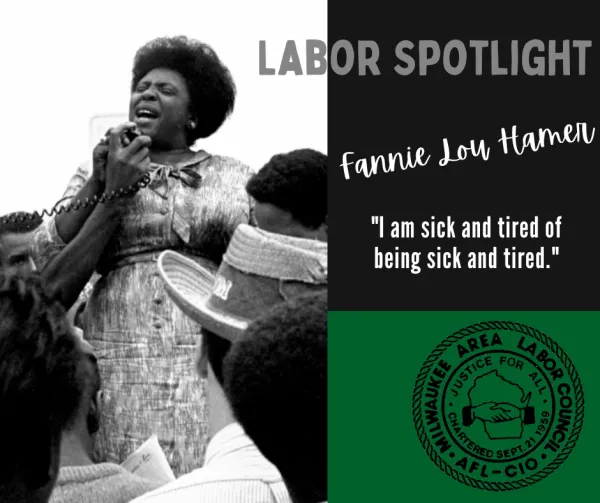Labor Spotlight- Fannie Lou Hamer

Fannie Lou Hamer, instrumental in organizing Mississippi Freedom Summer for the Student Nonviolent Coordinating Committee (SNCC) was born Oct. 6, 1917, in rural Montgomery County, Miss. She was the 20th child of Jim and Lou Ella Townsend. The family later moved to Sunflower County where, as sharecroppers they worked on a cotton plantation and Hamer began working in the cotton fields at age six.
In the 1950s, while she and her husband worked as sharecroppers in Ruleville, Miss., Hamer attended several regional civil rights conferences. In 1962, after attending a voters’ rights conference by the SNCC, she volunteered to lead a group of African Americans seeking to register to vote in Indianola, Miss. The next day she was kicked off the plantation where she had lived and worked for 18 years. Her husband lost his job, too.
Hamer immediately went to work as a field organizer for SNCC. Returning home from a training workshop in June 1963, Hamer's bus was intercepted by policemen. She and two others were taken to jail in Winona, Miss., and mercilessly beaten. After she recovered, Hamer returned to Mississippi to organize voter registration drives, including the "Freedom Ballot Campaign," a mock election, in 1963, and the "Freedom Summer" initiative in 1964.
In 1964, Hamer helped organize the Mississippi Freedom Democratic Party (MFDP) to challenge Mississippi's all-white and anti-civil rights delegation to the Democratic National Convention. Hamer was allowed to address the credentials committee and that session was nationally televised. She told the committee:
All of this is on account we want to register [sic], to become first-class citizens, and if the Freedom Democratic Party is not seated now, I question America. Is this America, the land of freedom and home of the brave where we have to sleep with our telephones off the hooks because our lives be threatened daily because we want to live as decent human beings—in America?
Negotiations were held to allow MFDP delegates to be seated at the convention, and when she refused a compromise that would have permitted two non-voting MFDP delegates to be seated, Hamer was asked why she was persisting. She replied:
All my life I’ve been sick and tired. Now I’m sick and tired of being sick and tired.
While negotiations at the 1964 convention failed, Hamer’s and the MFDP’s efforts changed the debate to the point that the Democratic Party adopted a clause that demanded equality of representation from their states' delegations in the 1968 convention. She was a member of the 1968 Mississippi delegation.
Hamer continued her work throughout her life, including working with Dr. Martin Luther King Jr.'s Poor People's Campaign. She died in 1977.
